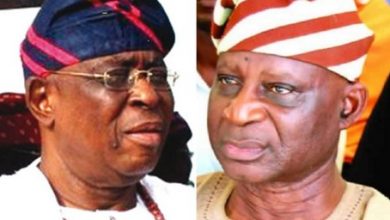BURUJI KASHAMU CAN BE ARRESTED, SAYS APPEAL COURT
‘So, clearly what was appealed and decided upon by the Court of Appeal today has nothing to do with extradition. Rather, it was about the failed 2015 abduction.Let me reiterate that in the face of the law, I do not have any extradition case to answer. Shun of all political manipulations and wizardry in Nigeria where political opponents pull down people to climb up the political ladder, I do not have any extradition case to answer’.
‘I wish to say for the umpteenth time that there is no way any extradition proceedings can be brought against me in the face of the law. What I have been fighting is the attempt to abduct or kidnap me in the guise of an extradition.
‘It is a matter of public record that the purported extradition case that was filed against me in May 2015 was dismissed by the Federal High Court, Abuja, for being an illegality. It could not stand the test of the law. The case could not have seen the light of the day in Nigeria or any civilized country. That was the point the trial judge, the Honourable Justice Gabriel Kolawole made in the judgment when he described the incident as “a show of shame”.
‘ He found it incomprehensible that any government official or agency could want to take any step or collaborate with some foreign agents under any guise to perpetrate an illegality after several courts had given judgments against such an action’.
‘So, in the face of the law, that case cannot be brought again! Any other talk or insinuations about a non-existent extradition only exists in the imagination of the mischief-makers. Therefore, there cannot be any other extradition but abduction and an illegality’.
‘This is even more so when the judgment of the British Courts that found the allegation against me to be a case of mistaken identity was not appealed. If a court of competent jurisdiction has pronounced that I AM NOT the person who committed the offence and same verdict has been upheld by our own courts, there is no way this finding and pronouncements of the court can be jettisoned for illegality.It is this illegality that the Senate frowned at in a resolution passed on the 11th of April, 2017’.
‘The Senate through its Committee on Ethics, Privileges and Public Petitions resolved, “That the concerned agencies and authorities be advised to stop threatening or carrying out any activities to extradite Senator Buruji Kashamu to the United States of America for prosecution, and that the courts be allowed to handle the various aspects of the case before them without any interference.”
‘Despite the fact that the British courts had exonerated me, I have an abiding faith and believe in our judiciary. We have many people in the judiciary from rich background and reputable families. They do not have to be judicial officers. But, today they are judicial officers because of the call of the Almighty Allah upon them’.
‘They sit in courts five days in a week, taking cases and writing judgments upon judgments in long hands. They deny themselves of the freedom that the rest of us enjoy. They cannot have friends and live their lives freely like the rest of us’.
‘Invariably, by accepting to do the job most of us cannot do, they are sacrificing a lot. They belong in the class of some of the best and finest men and women that a society can ever ask for; powerful people yet self-effacing with the fear of God. They know that even when they are judges, they are still conscious of the fact that they are also accountable to the Almighty Allah who is the ultimate judge’.
‘Despite the imperfections in the system, we should respect them because they represent the unseen hands and unheard voices contributing their quota to the development of our dear country. It is because of these unseen hand and unheard voices that Nigeria has not become a banana republic where injustice can be perpetrated with reckless abandon’.
‘Mischief makers and blackmailers should stop all the noise-making. I do not have anything to do with crime and criminalities. Those peddling this lie are merely playing the devil’s advocate. But I take refuge in the Almighty Allah Subwana ta Allah. He is my shepherd and shield. Even though I walk through the valley of the shadow of death, I shall fear no evil’.
‘In the meantime, my lawyers have filed a Notice of Appeal and a Motion for injunction pending the determination of the appeal to the Supreme Court of Nigeria. And I trust that the apex court will do justice. I also wish to use this medium to appeal to all my associates, lovers, supporters and leaders to remain calm. The truth shall prevail over falsehood as light triumphs over darkness’.
Penpushing, however, report that, despite all the controversies surrounding Kashamu’s case, the U.S. authorities have not publicly disclosed whether they sought his extradition or not,but some legal analysts said there was no need to make such request public, adding that the NDLEA’s move to arrest him and send him to the U.S. was enough grounds to conclude that the U.S. was interested in the matter.






